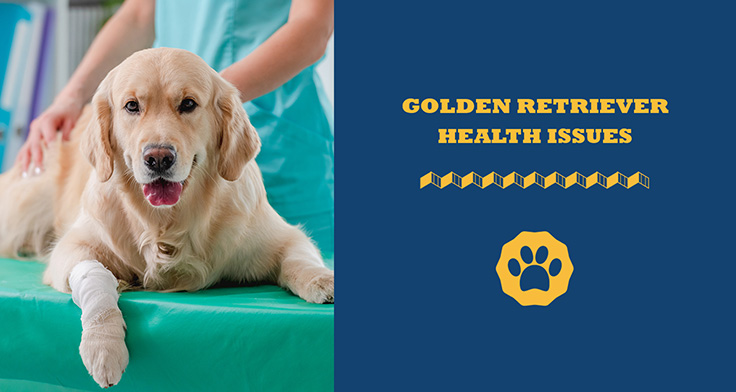Updated: November 11th, 2022
This article contains affiliate links. Read the full disclosure here.

It shouldn’t be surprising that the golden retriever is one of America’s most loved dog breeds. They are loyal, friendly, intelligent, and very devoted dogs, but just like any other dog breed, they are prone to certain diseases. Today, I’ll take you through the golden retriever health issues you should know about.
As a loving pet parent, you know your retriever deserves the best care. Knowing about these issues, and how to help resolve them, in advance is just one of the ways to provide it.
You may have seen one or two of these conditions mentioned somewhere or thrown into a discussion, but today you have a chance to know all the diseases and disorders your golden is most prone to. This list is based on observations, years of research, and recurrent studies.
Let’s begin, shall we?
The Most Common Golden Retriever Health Issues
- Hip Dysplasia
- Cancer
- Skin conditions
- Heart and chest conditions
- Epilepsy
- Eye problems
- Von Willebrand Disease (VWD)
- Patella luxation
- Separation anxiety
Clearly, the health problems of golden retrievers are not unique to this breed only. Some such as skin conditions and eye problems are shared across the board. Let’s now look at each of them briefly.
1. Hip Dysplasia

For your golden retriever to walk, run, or sit properly, the ball-shaped head on the upper side of their thigh bone has to fit properly and move freely within the socket of their hip joint. Also, the ligaments and tissues that hold the bones together have to be strong and healthy.
Hip dysplasia occurs when the joint and socket of a dog’s hip assume an abnormal shape or form. It could be that the ball is oversized or the socket isn’t shallow enough. Add to that weak ligaments or tissues and the condition becomes even worse.
Hip dysplasia should not go untreated for long because it could lead to pain, hip inflammation, and in severe cases, disability. Because it mostly occurs when pets age, you should get your golden retriever foods and hip supplements that will help to strengthen their joints and keep them in a healthier state.
I would recommend the following diets:
- Blue Buffalo Natural Veterinary Diet
- Royal Canin Large Joint Care Dry Dog Food
- Hill’s Prescription Diet Metabolic + Mobility,
2. Cancer
Goldens take the lead among breeds that are most prone to cancer. Studies have found that at least 60% of registered golden retrievers succumb to cancer, with males taking the lead at 57%.
Hemangiosarcoma is the most common cancer type among this breed, followed by lymphosarcoma, mastocytoma, and osteosarcoma.
As is the case with all cancers, early diagnosis is the only way to have a good chance of keeping any of these conditions from becoming fatal to your dog. Be vigilant and watch out for the signs and symptoms.
3. Skin Conditions
Studies show that at least half of registered goldens will suffer from skin complications during their lifetime. This shouldn’t come as a surprise because the breed’s long coat and dense undercoat create a thriving environment for bacteria.
Aside from bacteria, other culprits include dirt, mold, fleas, ticks, mites, pollen, and parasites. Signs and symptoms include flaky, itchy, and reddish skin. Also, be on the lookout for the following skin conditions:
- Seborrhea
- Environmental allergies
- Sebaceous cysts
- Lipomas
- Lick granuloma
Call a vet as soon as you notice any of these symptoms or conditions we have mentioned. Also, know that there are some great skin & coat supplements for Golden Retrievers, that can definitely benefit your pooch’s skin and fur condition.
4. Heart And Chest Conditions

Because they belong to the large breed family, golden retrievers are more prone to conditions that affect the lungs, heart, and entire circulatory systems than smaller dogs.
Subaortic stenosis (SAS) is the most common complication among goldens. Put simply, it happens when the vessel that transports blood from a dog’s heart to the rest of the body narrows, making the heart work extra hard. Unfortunately, this can lead to death.
Signs and symptoms of this condition include difficulty breathing, body fatigue, or lethargy. Have your golden retriever’s heart checked regularly to prevent SAS.
5. Epilepsy
In golden retrievers, epilepsy most often takes the form of seizures. The exact cause of this disorder is unknown, but it is inherited.
As a pet owner, it is important that you learn how to deal with dog seizures and know they are not handled the same way as human seizures. If you are close to a vet, my recommendation would be to take your dog to them immediately if a seizure occurs.
6. Eye Problems
Cataracts are the most recorded eye problem among golden retrievers. This condition manifests in the form of a cloudy white covering, which may partially or fully dominate your dog’s eyes. Retrievers that suffer from diabetes are more prone to developing cataracts.
When your dog is rubbing or scratching their eyes a lot or is clumsy, that could be a sign of cataracts. You could use eye gels to help relieve the discomfort, but they will not cure the condition. Watch out for changes in your dog’s eye color, shape or size as well.
Other eye problems that have been reported among this breed include eyelid/eyelash abnormalities.
All of these complications develop as your dog grows older and if left untreated can lead to more serious conditions, including blindness.
7. Von Willebrand Disease (VWD)
Von Willebrand disease, or VWD, is a bleeding disorder that has been widely reported among golden retrievers. Dogs that suffer from it may bleed excessively during surgery or upon an injury. This bleeding tendency could also extend to the gums, nose, and internal organs.
Bleeding tendencies in dogs can result from liver failure, autoimmune diseases, cancer, infectious diseases that cause blood disorders, or toxin pressure. Your dog could also inherit VWD from its ancestors.
This bleeding disorder can be fatal if left untreated. Rush to a vet immediately if your dog starts to bleed more than is normal.
8. Patella Luxation
Also known as loose knees, this is a disease where the dog’s knee cap snaps out of position. A vet could recommend surgery based on the movement and severity of the patella. You can tell your dog suffers from this congenital disease if she limps, skips intermittently, or has unusual sitting posture.
Even though your dog could live with patella luxation while still leading a happy, healthy life, there are ways to support them. You can start with pain relievers, then move on to joint supplements, bandages, or braces.
9. Separation Anxiety
Goldens love to have fun. They won’t pass up any chance to play or make new friends, and they are loyal and happier when you are around them. If you leave them alone for long periods of time or do not take them out to play or exercise often, they will develop separation anxiety. This will cause even well-trained dogs to act out to get attention, in ways such as damaging your furniture or other belongings or doing their business inside instead of out.
Another way to deal with separation anxiety is to get your dog stress relief supplements or chewy toys. Such play items offer mental stimulation and can help to relieve boredom as well as separation anxiety.
In some cases, you might consider offering your dog calming treats to help him deal with anxiety.
In other cases, after consulting with a vet, you may be recommended to treat your 4-paws friend with CBD for dogs. You can learn all about the differences between Hemp oil and CBD oil in this article.
Other notable golden retriever common health issues you should be on the lookout for include:
- Low thyroid
- Bloat and gastric dilatation volvulus (GDV)
- Ear infections
- Panosteitis
Frequently Asked Questions About Health Problems In Golden Retrievers
Are Golden Retrievers Healthy Dogs?
Golden retrievers are generally healthy dogs and can live for an average of 10-15 years. This finding is based on purebred golden retrievers which you can get from legitimate, well-known, trusted breeders.
Such dogs have already been screened for all the health issues that golden retrievers are prone to. Provided you take good care of them, they should be able to lead a healthy life.
Do Golden Retrievers Get Cysts?
Yes, golden retrievers are prone to cysts, the most common being sebaceous cysts. Most often these appear in the form of a raised bump on their skin. It may not bother your dog at all, but it would still be good to talk to your vet so they can evaluate its severity.
What Are Golden Retrievers Allergic To?
Not only can golden retrievers cause allergy symptoms, but they are prone to suffering from allergies as well. Goldens are especially susceptible to allergens related to skin and food.
Skin allergies in this breed are mostly caused by environmental factors such as dust and pollen, genetics, and food intolerances. Canine atopic dermatitis, a.k.a. Canine AD or CAD, is a common skin disease in goldens caused by allergies. It has no cure yet but there are several long-term treatment options available.
As is the case with other dogs, food allergies in goldens are mostly caused by animal proteins, specifically beef and chicken; however, some retrievers could be triggered by other foods such as eggs, milk, and corn.
Final Thoughts About Golden Retriever Health Problems
It may seem like there are plenty of conditions your golden retriever is prone to, but this is not uncommon. Every breed has a list of diseases they are prone to, some of which are genetic. The good news is that you have a chance to prevent or cure most of the health problems of golden retrievers.
Take time to familiarize yourself with the symptoms of each of the diseases mentioned and then be vigilant. As soon as any of them appears, the wisest thing to do is to consult a vet.
In addition, don’t forget to take your golden retrievers for regular health checkups so your vet can rule out any unusual symptoms.



